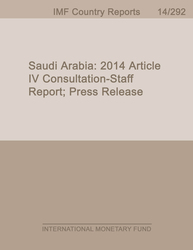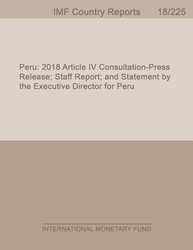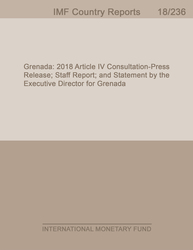
Saudi Arabia: Staff Report for the 2014 Article IV Consultation
Volume/Issue:
Volume 2014
Issue 292
Publication date: September 2014
ISBN: 9781484318898
$18.00
Add to Cart by clicking price of the language and format you'd like to purchase
Available Languages and Formats
| Arabic | ||||
| English |
Prices in red indicate formats that are not yet available but are forthcoming.
Topics covered in this book
This title contains information about the following subjects.
Click on a subject if you would like to see other titles with the same subjects.
Inflation , Economics- Macroeconomics , Public Finance , Business and Economics - Statistics , ISCR , CR , market , economy , SDR Department , IFC Riyadh office , oil market , equity price , private sector employment , oil price , totaling SDR , liability positions vis-à-vis nonresident , Oil prices , Oil , Income , Global
Also of interest
Summary
KEY ISSUES Context. Saudi Arabia’s economy has grown very strongly in recent years, benefitting from high oil prices and output, strong private sector activity, and government spending. It has played a systemic and stabilizing role in the global oil market. The economy has not been affected by the recent global financial market volatility. The Saudi population is young, growing, and increasingly well educated. Outlook and risks. The near term economic outlook is positive. Oil production is expected to be little changed from 2013, while non-oil growth will be underpinned by strong private sector activity and government spending on large projects in transportation infrastructure and housing. Inflation is expected to remain subdued. The main source of risk is the global oil market. Macroeconomic policies. Fiscal buffers are strong at present, providing macroeconomic policies with scope to respond to shocks. The current path of fiscal policy would, however, lead to a substantial erosion of these buffers over the medium-term. Fiscal adjustment needs to start to preserve these buffers and increase saving for intergenerational equity purposes. Monetary and macro-prudential policy settings are appropriate at present. Reforms to the macroeconomic policy framework can help strengthen macroeconomic management and create an environment conducive to private investment and job creation. Managing demographic pressures. A multi-pronged labor market reform program is increasing the employment of nationals in the private sector and improving the functioning of the labor market. An ambitious program to boost the supply of housing is also underway. Energy consumption is high, and price increases are needed to support efforts to increase energy efficiency and develop public transportation networks. Economic diversification. Creating a more diversified economy is a challenge given Saudi Arabia’s vast oil resources. The government is making considerable efforts to lay the groundwork for further diversification by upgrading infrastructure, strengthening education and skills, boosting access to finance for SMEs, and improving the business environment. However, more needs to be done to realign incentives to encourage firms to export and workers to seek jobs in the private sector.
Copyright © 2010 - 2026
Powered by:
AIDC



